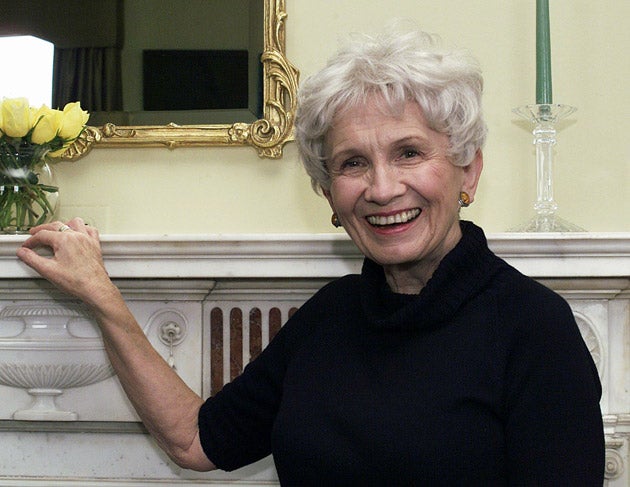Too Much Happiness, By Alice Munro

In some minds, Alice Munro is a regionalist, a writer about mere "place". To a certain extent, that's how she began, and how her publishers defined her appeal. The blurb on my British edition of her first book proclaims: "Alice Munro's territory is the farms and semi-rural towns of south-western Ontario." A special weight is being given here to the term territory, familiar in, for instance, Faulkner criticism: an actual terrain as well as its specific, irreducible incarnation in language. Particularity and concreteness may or may not have been characteristics of places, but they were certainly bestowed upon them by writers.
Munro, in those early fictions, might well be the last great regionalists – not a writer of mere "place", but a person who makes us think anew of how we experience and recall the particular and unnoticed. But she also must have been aware, with the intuition and clear-sightedness that mark her writing, that, by the late 1960s, the age of the regional – of places with an inner climate of their own – was almost over. "Place" was going to be almost completely replaced by the suburban, and the hardly-noticed by a democratic anonymity.
This is evident from the slight anxiety in one of her statements at the time: "I guess that maybe as a writer I'm kind of an anachronism... because I write about places where your roots are and most people don't live that kind of life at all." Munro responded to this development in a way that can only be called courageous: wisdom, in her work, came to qualify the luxury of sensuousness.
In lieu of focusing on the detail and the moment, as short stories tended to do, she shifted her gaze to the secrecy of drab and textureless lives, of how they were shaped and then sealed by unexpected events and chance happenings. Her stories became part of a process of educating herself in the secret life of "texturelessness". They have been called "novelistic", and I think that quality should be seen in conjunction with Munro's wise conciliation with the gradual fading of "place".
This wonderful new collection continues to explore her chief preoccupation – what is it that constitutes a life, and gives it its uniqueness, in the absence of any sign of singularity: not only the success or failure or money that fascinated Fitzgerald, but the sort of idiosyncrasy we associate with Eudora Welty's universe. Many of Munro's characters, and the prism of her narratorial voice, are deeply "normal"; and it's this air of stubborn, sociable normalcy that she at once enriches and undermines. This is even true, you feel, of the long title story, based on a journey taken by an actual figure from the 19th century, the mathematician and novelist Sophia Kovalevski. In spite of her many achievements, she discovers towards the end of her life that her basic happinesses are more palpable to her than whatever amorphous sense of destiny she has.
Other characters have achieved far less. In the impressive "Deep-Holes", the story is told from the point of view of a mother, Sally, and takes as its starting-point a near-tragic accident. Sally and her husband Alex, a geologist, and their three children go on a picnic; as Sally nurses her infant daughter, Peter and the precocious Kent ("a sneak and a trouble-maker") wander off by themselves. Kent falls into a "deep-hole", is rescued by his not overly emotional father, and survives with a limp. Encountering death makes Kent, in a way, more humane, but also odder; when he grows up, he severs all ties with his family. But the world of the story remains, largely, Sally's, at once informed by and unwilling to grasp whatever principle of life it is that Kevin represents.
Towards the end, Sally goes to an unsalubrious part of town to meet her son, now a sort of social worker; there is no reconciliation. Sally has not only to reconcile herself to the loss of this son, to the unexceptional state of her life, but – and this is the burden of many of these stories – to the fact that, unlike Kevin, she has no marks of destiny.
She will not give in to Kevin, though, especially on that symbolic plane: the final statement could, with its resolve, be an opening statement: "She has seen the look on the faces of certain old people – marooned on islands of their own choosing, clear-sighted, content."
"Free Radicals" rehearses many recurrent concerns of this collection – age, imminent or recent deaths, and, most often and powerfully, the right to be unexceptional. Nita, an ageing widow, is trying to create her own private space after her husband's death. Her ambitions are unremarkable. Into this life steps a killer on the run, who eats her food, has a strange, long conversation with her, takes her car keys, but leaves without murdering her. In a Flannery O'Connor story, this character would have taken over the narrative. Nita, however, not only manages to keep him out literally, but imaginatively. She represents what's of greatest interest to Munro – not epiphanic revelation, but the commonsensical yet primeval urge to accommodate, survive and move on.
Amit Chaudhuri's latest novel 'The Immortals' is published by Picador
Join our commenting forum
Join thought-provoking conversations, follow other Independent readers and see their replies
Comments
Bookmark popover
Removed from bookmarks